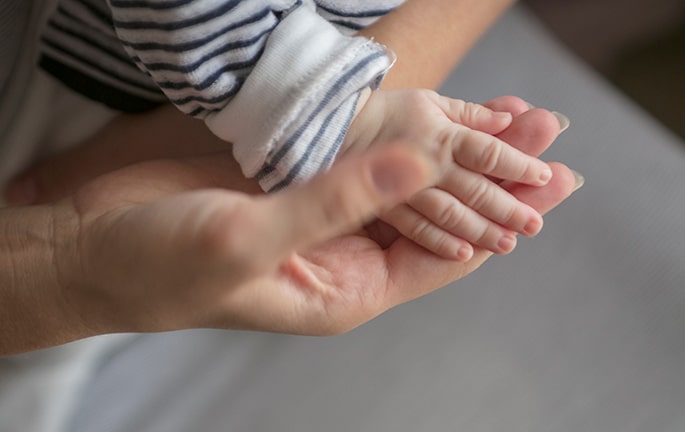Paediatric rheumatology
Find out everything you need to know about paediatric rheumatology and what isits field of study. We talk to you about the main diseases it treats and the procedures and tests most commonly performed in this speciality. Book your appointment with the child rheumatologist at one of our hospitals.

What is paediatric rheumatology?
Paediatric rheumatology is a branch of paediatrics that specialises in the diagnosis and treatment of diseases affecting the locomotor system (bones, muscles, joints and tendons) of both children and adolescents. It also deals with connective tissue disorders and autoimmune pathologies.
In this speciality, we approach prevention and diagnosis taking into account the particularities of paediatric patients, in terms of clinical presentation, diagnosis, treatment and prognosis, which are different from those of adults.
Which patients is the child rheumatology consultation aimed at?
Child rheumatologists treat paediatric patients with autoimmune, connective tissue or inflammatory diseases of the musculoskeletal system.
What does paediatric rheumatology study?
Paediatric rheumatology addresses autoimmune and autoinflammatory diseases, as well as rheumatic pathologies that alter the normal state of the joints, muscles and ligaments that surround them. One of its main goals is research to ensure that these diseases have as little impact as possible on children’s quality of life. In order to better understand their condition and, consequently, offer children more suitable treatments, child rheumatologists tend to focus on specific areas of the speciality such as:
- Systemic autoimmune diseases: prevent the immune system from working properly and cause antibodies to attack healthy cells and tissues. They require a multidisciplinary approach due to their complexity and low incidence in the paediatric age group.
- Spondyloarthropathies: chronic pathology that affects the joints and is usually caused by an alteration of the HLA-B27 gene.
- Childhood rheumatoid arthritis: causes stiffness, pain and loss of movement in the joints.
- Immunosuppression: subspecialty that manages the condition of patients receiving biological therapies, with immunomodulators or immunoregulators, which cause a weakening of the immune system.
Techniques, procedures and diagnostic methods
Both a medical and family history and a physical examination are key to be able to diagnose rheumatic diseases in children and adolescents in the best possible way. Our specialists also study the results of more specific tests that offer clearer findings in order to establish the most suitable treatment in each case. The main diagnostic methods and rehabilitative techniques include:
- Ultrasound: a diagnostic imaging test that shows images of internal organs with the use of high-frequency sound waves.
- Infiltrations: an analgesic injection directly into the joint or muscle to reduce pain.
- Arthrocentesis: procedure to remove excess fluid from a joint with a needle to reduce pain and swelling.
- Capillaroscopy: diagnostic method that provides images of the distal periungual capillaries and enables assessment of the circulation of the veins in the hands.
Diseases and symptoms
Main pathologies and diseases treated by the child rheumatologist
A paediatric rheumatologist assesses and treats a variety of disorders, including:
- Acute joint inflammation (arthritis)
- Chronic arthritis, including juvenile idiopathic arthritis

- Lupus
 and related conditions including, Sjögren’s syndrome, scleroderma and mixed connective tissue disease
and related conditions including, Sjögren’s syndrome, scleroderma and mixed connective tissue disease - Dermatomyositis and other forms of muscle inflammation
- Vasculitis, which involves inflammation of the blood vessels. This includes Kawasaki disease
 , Henoch- Schönlein
, Henoch- Schönlein purpura, antineutrophil cytoplasmic antibody (ANCA)-associated vasculitis and Behçet’s disease
purpura, antineutrophil cytoplasmic antibody (ANCA)-associated vasculitis and Behçet’s disease - Autoinflammatory syndromes including PFAPA (periodic fever, aphthous stomatitis, pharyngitis, adenitis) and other periodic fever syndromes
- Chronic uveitis (inflammation inside the eye)
- Joint hyperlaxity
- Sarcoidosis
- Systemic lupus erythematosus
- Antiphospholipid syndrome
- Spondylodiscitis
About the paediatric rheumatology consultation
We solve any doubts you may have before you see the specialist
At the first appointment, the rheumatologist will take your child’s medical and family history and then carry out a comprehensive physical examination. They will then order the additional tests required to complete the analysis.
In subsequent visits, in addition to establishing a diagnosis, they will propose a treatment and monitor the effects of the treatment and the evolution of the pathology, accompanying the minor and their family.
When to go to a paediatric rheumatology consultation?
Although paediatricians usually refer children and adolescents with symptoms compatible with a rheumatic disease to a child rheumatologist, there are particular symptoms that may indicate the need to consult this type of specialist:
- Significant changes in the locomotor system and movements: musculoskeletal conditions are one of the most important clinical manifestations.
- Prolonged fever of no apparent origin
- Skin lesions
- Mouth ulcers
- Swollen glands
- Eye problems / irritation.
What should I take to the appointment?
At Quirónsalud we recommend taking to the appointment the most recent reports and analyses related to the condition and a list of the symptoms that the child has shown and how they have evolved over time.
Any information relating to the symptoms is important, for example, in the case of pain, whether it appears during sport or at rest, whether it is initially related to trauma or not, etc.
You may receive a questionnaire a few days before your appointment asking about your medical history, usual medication and other specific questions that will allow us to anticipate certain aspects of your consultation, helping us expedite your treatment and offer you a more personalised care. To do this, we recommend that you download the free Quirónsalud Patient Portal application, which will facilitate communication with your healthcare team.

If you have any further questions, please contact us through the Patient Services telephone number: 900 301 013






